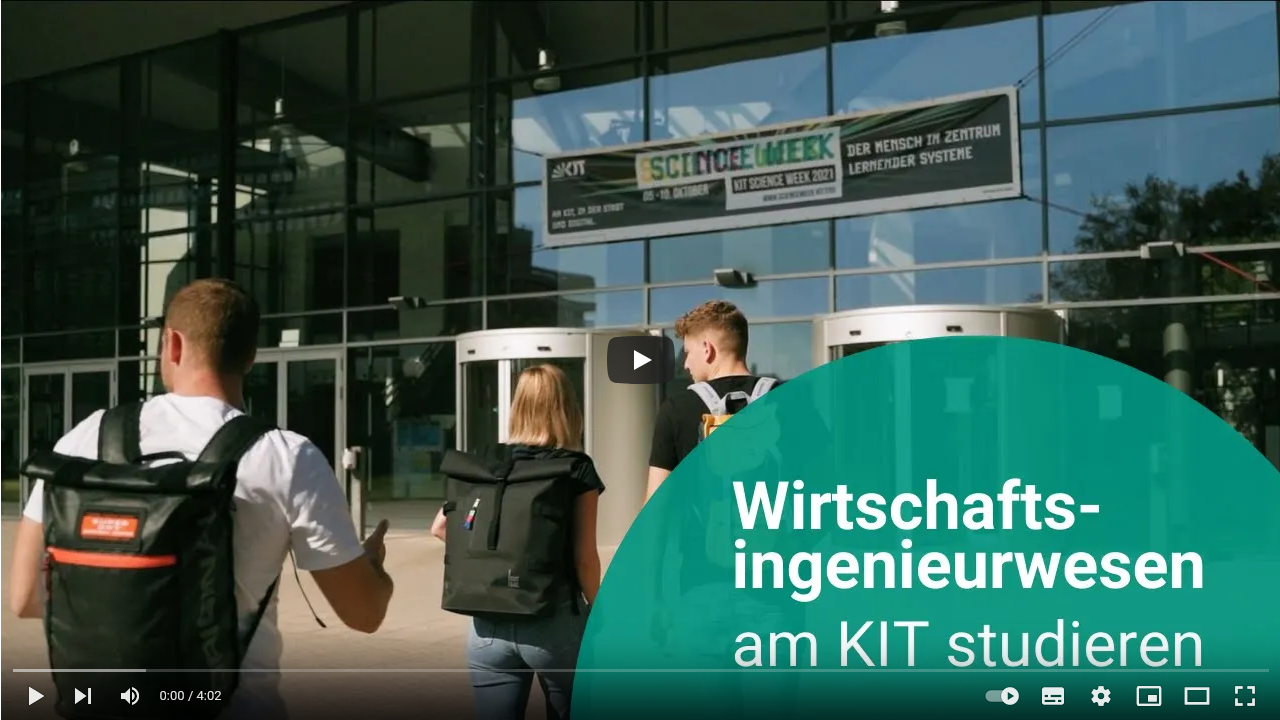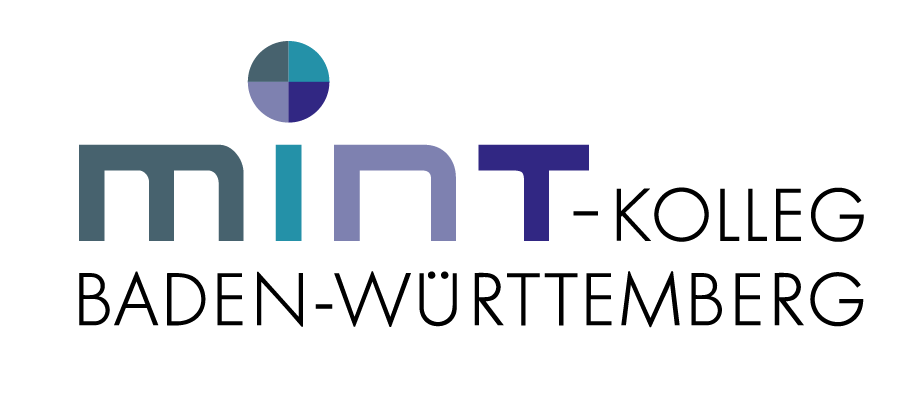Degree: Bachelor of Science (B.Sc.)
Regular program length: 6 semester (full-time program)
Credit points (ECTS): 180 credit points
Language of instruction: German
Higher semester: yes
Higher semester: winter and summer term
First semester: July 15
Higher semester: July 15 for winter term, January 15 for summer term
First semester: July 15
Higher semester: July 15 for winter term, January 15 for summer term
Studiengangsbeschreibung
Worum geht’s?
Wirtschaftsingenieurwesen ist eine Schnittstellendisziplin, die betriebs- und volkswirtschaftliche, mathematisch-naturwissenschaftliche und technologische Fragestellungen verbindet. Im Bachelorstudium lernst du, technische und kaufmännische Betriebsstrukturen und -prozesse zu analysieren und zu optimieren – etwa in den klassischen unternehmerischen Funktionsbereichen Beschaffung, Produktion, Marketing, Vertrieb und Finanzen oder in Querschnittsfeldern wie Logistik, Forschung & Entwicklung oder Unternehmensführung. Eine große Rolle spielen im Studium zudem Themen wie Innovation und Transformation, Nachhaltigkeit und Umweltschutz, bspw. in den Bereichen Digitalisierung, Mobilität und Energie. Oder du vertiefst dich im Bereich Entrepreneurship und Gründung. Im ingenieurwissenschaftlichen Teil des Studiums erwirbst du Kenntnisse und Kompetenzen in Material- und Werkstoffkunde, Elektronik und Mechanik. Je nach Interessenschwerpunkten können aber auch Bauingenieurwesen, Bio- oder Chemieingenieurwesen zu deinen Bezugsdisziplinen werden. Mathematik und Informatik sind unerlässliche Grundlagenwissenschaften für das Studium.
Program structure
During your studies, you have various subjects, which consist of one or more modules. A module deals with a specific topic and consists of one or more courses. In the module handbook for your degree program, you will find a description of the modules and their subject assignment as well as a study plan. This gives you an orientation as to which courses you should attend in which semester in order to complete your studies within the standard period of study. It takes into account a balanced distribution of courses over the individual semesters. It also ensures that you are first taught the important basics before moving on to more advanced topics. Your individual course of study may differ from this.
Der Studienplan des Bachelorstudiengangs Wirtschaftsingenieurwesen am KIT gliedert sich in ein schwerpunktmäßig wirtschaftswissenschaftlich und methodisch ausgerichtetes Grundlagenprogramm (Semester 1-3) und ein Vertiefungsprogramm (Semester 4-6), welches dir eine individuelle Profilbildung ermöglicht.
Die im Grundlagenprogramm zu absolvierenden Fächer sind: Betriebswirtschaftslehre (BWL), Volkswirtschaftslehre (VWL), Informatik, Operations Research, Ingenieurwissenschaften, Mathematik, Statistik.
Im Pflichtbereich des Vertiefungsprogramms musst du jeweils ein weiteres Modul in den Fächern BWL, VWL, Informatik, Operations Research und den Ingenieurwissenschaften sowie ein Seminarmodul belegen. Im Wahlpflichtbereich entscheidest du dich für ein Modul aus den Fächern BWL oder Ingenieurwissenschaften. Ein weiteres Modul musst du in einem der folgenden Fachgebiete absolvieren: Informatik, Operations Research, BWL, VWL, Ingenieurwissenschaften, Statistik, Recht oder Soziologie.
Ausführliche Informationen zu den Inhalten der Fächer und Module findest du im Modulhandbuch.
Berufspraktikum
Zum Pflichtprogramm deines Bachelorstudiums gehört auch ein mindestens 12-wöchiges Berufspraktikum. Dieses muss kaufmännisch und/oder technisch ausgerichtet sein und du kannst es vor oder während des Studiums absolvieren.
Auslandsaufenthalte
Im Bachelorstudiengang Wirtschaftsingenieurwesen hast du die Möglichkeit, wertvolle internationale Erfahrungen zu sammeln, beispielsweise im Rahmen eines Auslandsstudiums, bei dem du ein oder zwei Semester ohne Studiengebühren an einer Partnerhochschule studieren und Leistungen erbringen kannst, die dir bei deiner Rückkehr ans KIT anerkannt werden können.
Das International Relations Office (IRO) der KIT-Fakultät für Wirtschaftswissenschaften informiert dich über bestehende Programme wie Erasmus+, EPICUR und Eucor, über fakultätseigene Lehrstuhldirektkooperationen sowie die Austauschprogramme nach Übersee und unterstützt dich bei der Planung und Organisation deines Auslandsprojektes, auch wenn du ein Auslandssemester als Freemover planst oder wenn du lieber ein Auslandspraktikum absolvieren möchtest.
Eine weitere wichtige Anlaufstelle, wenn du einen Auslandsaufenthalt planst, ist das International Students Office des KIT, das weitere Programme zentral für alle KIT-Studierenden anbietet.
Im Masterstudium hast du die Möglichkeit einen deutsch-französischen Doppelabschluss zu machen.
Bachelorarbeit
Zum Abschluss deines Studiums fertigst du eine Bachelorarbeit an, mit der du zeigst, dass du eine Problemstellung im Bereich Wirtschaftsingenieurwesen selbstständig und nach wissenschaftlichen Methoden bearbeiten kannst. Der Umfang der Bachelorarbeit entspricht 12 LP. In der Regel schreibst du die Bachelorarbeit auf Deutsch. Auf Antrag kann sie jedoch auch in einer anderen Sprache verfasst werden. Die maximale Bearbeitungsdauer beträgt sechs Monate.
Weitere Informationen
Außer dem Modulhandbuch ist unsere Studiengangbroschüre eine nützliche Informationsquelle. Sie behandelt auch Themen wie Bewerbungsverfahren, Studieneinstieg und Berufsperspektiven.
Qualification profile of the graduate
The Bachelor of Industrial Engineering and Management is divided into a basic program with mandatory modules (semesters 1-3 with a total of 92 credit points (CP)) and a specialization program with elective modules (semesters 4-6 with a total of 88 CP).
The course of studies strongly focuses on quantitative methods. The foundations are laid in the basic program which features mandatory modules comprising three mathematics courses (analysis, linear algebra, differential equations), two statistics courses (descriptive and inductive statistics, probability theory, regression), and two operations research courses (various optimisation models and methods). The other modules of the basic program pick up these foundations and carry them forward with subject-specific focuses.
The interdisciplinary Bachelor of Industrial Engineering and Management aims for a broad qualification in the following five thematic core fields: Business Administration, Economics, Informatics, Operations Research, and Engineering. In the specialisation program it is possible for students to set a certain thematic focus, whereby at least one module (9 CP, usually comprising two lectures with tutorials) of each of the five core subjects must be accomplished in order to achieve the envisaged breadth of qualification. One seminar module and two additional modules must be completed. Of these, one module must be chosen from Business Administration or Engineering. Other than that, modules can be selected from Informatics, Operations Research, Business Administration, Economics, Engineering, Statistics, Law or Sociology. A full-time internship comprising at least 12 weeks provides an insight to business practices and to the job chances of industrial engineering.
At least one seminar and the Bachelor's thesis train the ability to compose and present an independent piece of research. The possibility of an international exchange is provided through ERASMUS+ programs and bilateral direct cooperation programs.
In Economics and Business Administration, a variety of theoretical approaches are applied as well as all commonly applied methods of empirical analysis: from the collection and analysis of field data to laboratory experiments and computer-aided simulations. The Business Administration courses comprise accounting, finance economy, business management, information engineering and management, industrial production, and marketing. The Economics courses comprise microeconomic and macroeconomic theories, industrial economics and network economics, public finance and economic policy, as well as political economy. In Operations Research, the methods and models of continuous, discrete, stochastic, and dynamic optimisation are taught and algorithmically applied. Informatics focuses on theoretical fundamentals as well as on practical methods for applying information and communication technologies in economy, management, and society. For classical Engineering the basic program introduces materials science, engineering mechanics, and electrical engineering, while the specialisation program takes advantage of the wide range of Engineering faculties at KIT which provide numerous specialisation options within the departments of mechanical engineering, civil engineering, electrical engineering, and of informatics.
This sound methodological education provides graduates with the skills to apply subject-specific terms, methods, models, and approaches, and to combine these in an interdisciplinary manner. They can analyse and evaluate economic and technological structures and processes. They are proficient in the fundamentals of project management and can take on responsibility in interdisciplinary teams.
They are able to carry out subject-specific and interdisciplinary debates and defend their views when discussing these with expert representatives and laypersons. They possess the ability to apply the acquired knowledge in career-related activities in the fields of industry, the service sector, or public administration, as well as the ability to take on the Master of Industrial Engineering and Management or a related course of study.
Berufsperspektiven
Erste praxisrelevante Erfahrungen sammelst du während deines Bachelorstudiums nicht nur durch dein verpflichtendes Berufspraktikum. Einblicke und Kontakte in die Arbeitswelt kannst du auch durch deine Teilnahme an Vorträgen und Workshops mit Referentinnen und Referenten aus der Wirtschaft bekommen sowie durch die Möglichkeit deine Abschlussarbeit in einem Unternehmen zu schreiben. Berufsperspektiven eröffnen sich dir dadurch als Fach- und Führungskraft überall dort in Industrie, Dienstleistung und öffentlicher Verwaltung, wo wirtschaftliche und technische Fragestellungen zusammentreffen, sei es an den Schnittstellen von Projekt- und Produktionsmanagement, Personalwesen und Informatik oder Marketing und Logistik. Alternativ kannst du dich nach Abschluss deines Bachelorstudiums auch für ein Masterstudium entscheiden.
Besonderheiten des Studiengangs
Besonderheiten von Wirtschaftsingenieurwesen B.Sc. am KIT
- Verankerung des Studiengangs an der KIT-Fakultät für Wirtschaftswissenschaften
- individuelle Studienplangestaltung
- freie Fachrichtungswahl in den ingenieurwissenschaftlichen Fächern ab Semerster 4
- 12-wöchiges studienbegleitendes Berufspraktikum
- hoher Informatik-Anteil
- Praxisbezug durch Module wie dem Teamprojekt „Wirtschaft & Technologie“
- fakultätsinternes International Relations Office zur Unterstützung von Auslandsaufenthalten
- Möglichkeit eines deutsch-französischen Doppelabschlusses im Rahmen des Masterstudiums (Bewerbung erfolgt bereits im Bachelorstudium)
- Brückenkurse und semesterbegleitende Kurse am MINT-Kolleg
- Partnernetzwerk mit Unternehmen für Firmenkontakte und Praktika während des Studiums
- KIT-Gründerschmiede
What KIT has to offer
- central campus close to the city forest and right next to the city center
- orientation week before the start of lectures
- 24-hour library offering single and group working places
- wide range of inexpensive catering options (dining hall, cafeteria, Koeri and Pizzawerk)
- numerous interdisciplinary offers for personal and professional development, e.g. Lernlabor, Schreiblabor and Perspektivenlabor
- study abroad, e.g. via Erasmus
- excellent university sports facilities with a large selection of sports
- comprehensive cultural offerings with university orchestras, choirs and theater groups
- extensive support for career entry and self-employment
- Lernraum app
- internationally oriented degree programs and diverse exchange programs
- modern laboratories and practical teaching methods
- diverse student initiatives, clubs and opportunities to actively participate in campus life
- stay in touch after graduation via the alumni network
Zugangsvoraussetzungen und Sprachnachweise
Higher education entrance qualification (HZB)
Germans and persons of equal status to Germans (i.e. EU/EEA nationals and non-EU/EEA nationals with a German higher education entrance qualification) are entitled to study at KIT if they have one of the following qualifications:
- General higher education entrance qualification (Abitur)
- (relevant) subject-restricted higher education entrance qualification (not Fachhochschulreife)
- Delta examination of the University of Mannheim (for holders of a Fachhochschulreife)
- recognized advanced vocational training (e.g. master craftsperson) or vocational training, professional experience and aptitude test for those with professional qualifications
For further options, see §58 of the "Landeshochschulgesetz" (State Higher Education Act).
Please note: German nationals with a foreign school-leaving qualification must have the relevant "Regierungspräsidium" (regional authority) certify that their qualification is equivalent to the German Abitur.
For non-EU/EEA nationals with a foreign school-leaving certificate (hereinafter also referred to simply as non-EU/EEA nationals), the school-leaving certificate from some countries is recognized as a direct university entrance qualification in Germany. In many cases, however, in addition to the school-leaving certificate, a university entrance examination and/or a successful year of study in the home country and/or the "Feststellungsprüfung" must be proven with valid documents in order to be allowed to study a bachelor's degree in Germany. You can find the country-specific regulations in the DAAD admissions database or on the Anabin website (in German only) of the "Zentralstelle für ausländisches Bildungswesen" (Central Office for Foreign Education). Further information is available from the International Students Office.
Sprachvoraussetzungen und -nachweise
Für den Bachelorstudiengang Wirtschaftsingenieurwesen benötigst du ausreichende Kenntnisse der deutschen Sprache, welche mindestens dem Niveau C1 des Gemeinsamen Europäischen Referenzrahmens für Sprachen (GER) entsprechen.
Proof of sufficient German language skills
Your higher education entrance qualification (HZB) is sufficient proof of your German language skills,
-
if you obtained it at a German-speaking school in Germany or abroad,
-
if you are a graduate of a bilingual secondary school in Germany or abroad and have passed a bilingual German examination, such as the AbiBac or the Gemischtsprachiges International Baccalaureat (GIB) or
-
if you graduated from a foreign school, but there is another official agreement with the respective country on the recognition of your school-leaving certificate or language certificate as proof of language proficiency for university studies in Germany.
A complete list of foreign school-leaving qualifications and language certificates that are recognized as proof of sufficient German language skills can be found on the website of the Kultusministerkonferenz (Standing Conference of the Ministers of Education and Cultural Affairs of the Länder in the Federal Republic of Germany).
If you did not obtain your higher education entrance qualification at a German-speaking institution, you must provide a separate language certificate - regardless of your nationality. Only the following are accepted
- the passed „Prüfungsteil Deutsch“ of the Feststellungsprüfung,
- the passed DSH with the overall result DSH-2,
- the passed TestDaF level 4 in all four parts of the exam (reading comprehension, listening comprehension, written expression, oral expression) or
- a comparable, recognized certificate of sufficient German language skills.
To find out which other recognized certificates can be accepted as comparable by KIT, please contact
- as a German or German-equivalent applicant: Studierendenservice
- as an applicant with non-EU citizenship: International Students Office
Please note:
Language certificates are extremely important application documents that can prevent your enrollment if you do not submit them on time. Therefore, check early on in the application process whether you have the necessary language certificates for your degree program and, if necessary, plan to take one of the language tests mentioned above. The deadline by which you must submit language certificates corresponds to the enrollment deadline stated in your admission offer. In justified cases, you can apply for an extension of this deadline. The extension can be granted until the start of the lecture period at the latest.
Additional necessary requirements for enrollment
For Germans and those with German equivalent status, an additional necessary requirement for enrollment is proof of participation in a study orientation test (e.g. www.was-studiere-ich.de) or a study orientation consultation in accordance with §7 of the "Landeshochschulgesetz" (State Higher Education Act), e.g. by the Student Advisory Service (ZSB) of KIT. Non-EU/EEA nationals do not have to provide this proof.
Auswahlverfahren
Auswahlverfahren für deutsche und Deutschen gleichgestellte Bewerberinnen und Bewerber
Es stehen 505 Studienplätze zur Verfügung. Nach Abzug der Vorabquoten für Härtefälle (5%), Ausländerinnen und Ausländer (10%) und Zweitstudienbewerberinnen und -bewerber (2%), werden 10% der Studienplätze an die Bewerberinnen und Bewerber mit der längsten Wartezeit vergeben. 90% der Studienplätze werden über ein Auswahlverfahren verteilt.
Das Auswahlverfahren basiert überwiegend auf deinen schulischen Leistungen. Anhand dieser und sogenannter sonstiger Leistungen wird eine Rangfolge nach Punkten gebildet:
- Summe der Punkte im Abiturzeugnis durch 56 bzw. 60 geteilt
max. 15 Punkte
- arithmetisches Mittel (Summe aller Punkte geteilt durch die Anzahl der Kurse) der Oberstufenkurse:
- Deutsch (Gewichtung 1-fach)
- Mathematik (Gewichtung 2-fach)
- bestbenotete, fortgeführte (moderne) Fremdsprache (Gewichtung 1-fach)
max. 15 Punkte - sonstige Leistungen (abgeschlossene einschlägige Berufsausbildung, einschlägige Berufsausübung, besondere Vorbildungen, praktische Tätigkeiten, außerschulische Leistungen und Qualifikationen)
max. 15 Punkte
Wert 1 + Wert 2 + Wert 3 = insgesamt max. 45 Punkte
Detaillierte Informationen zum Auswahlverfahren findest du in der Satzung für das hochschuleigene Auswahlverfahren des Studiengangs.
Die Ergebnisse der Auswahlverfahren der vergangenen Jahre findest du in der Broschüre Zulassungsergebnisse.
Selection procedure for applicants from non-EU/EEA countries
Please note that a different selection procedure applies for third-country nationals (non-EU/EEA). This selection procedure is based on the higher education entrance qualification. The higher education entrance qualification can be based on academic achievements in school, any previous academic achievements at universities and/or the "Feststellungsprüfung".
Application portal
Application for the 1st semester
Application for a higher semester
Study preparation
Prepatory courses at KIT: The MINT-Kolleg offers prospective and first-year students support in natural science and technical subjects (STEM).
In addition, the KIT-Departments offer special preliminary courses before the start of the semester program during the "O-Phase" (orientation week).
Support during your start at KIT
The KIT offers support for all first-year students in order to have a successful start of their studies. Numerous orientation events and mentoring programs at the KIT-Departments help students to make friends, orientate themselves and find support where needed. The central online portalstudienstart.kit.edu is a first guide to all important offers, brings together all relevant information and contains helpful hints for a successful start of your studies:
- advisory centers
- mentoring programs
- info sessions
- workshops
- extensive online information
Contacts
Student advisor
Student advisory services (ZSB)


Karlsruher Institut für Technologie (KIT)
Zentrale Studienberatung (ZSB)
Engelbert-Arnold-Str. 2
76131 Karlsruhe
Karlsruher Institut für Technologie (KIT)
Studierendenservice
Kaiserstr. 12
76131 Karlsruhe
First point of contact for international applicants
Karlsruher Institut für Technologie (KIT)
International Students Office (IStO)
Adenauerring 2
76131 Karlsruhe
Printed matter
Module handbook
Statutes and regulations
Teaching calendar
WT 2024/25
10-21-2024 to 02-15-2025
ST 2025
04-22-2025 to 08-02-2025
WT 2025/26
10-27-2025 to 02-21-2026
ST 2026
04-20-2026 to 08-01-2026
WT 2026/27
10-26-2026 to 02-20-2027
ST 2027
04-19-2027 to 07-31-2027
WT 2027/28
10-25-2027 to 02-19-2028
ST 2028
04-18-2028 to 07-29-2028
Lectures will not take place:
- From 12-24 to 01-06
- the week after Pentecost
- on all public holidays in the state of Baden-Wuerttemberg










